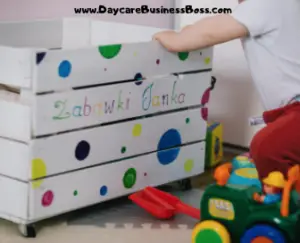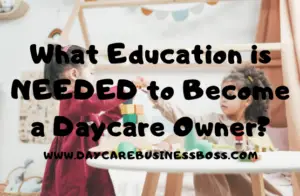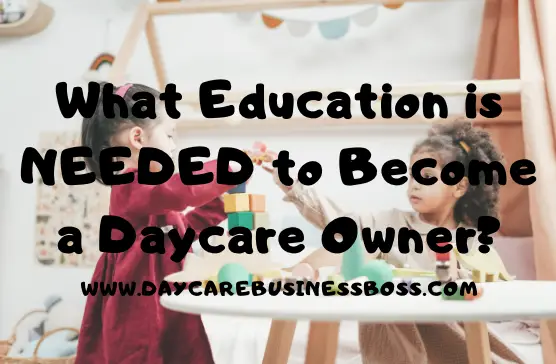If you are a retired teacher or a stay-at-home parent, you may have thought of opening your own daycare. Well, why not? According to the U.S. Bureau of Labor Statistics, childcare services are expected to have an 8% increase in employment. And especially with the ongoing pandemic and the rise in on-line classes, working parents are sure trying to find a reliable, relatively in-expensive day care center for their children. So, this may be the perfect time for you to make your dream of opening a daycare come true!
However, where does one begin with starting their own daycare? What are the educational requirements? And beyond education, what about insurance and licensing? And maybe other requirements you have never even heard about? Do not worry, we have got all the answers you need!
What Specific Education Is Required?
The education required to open a daycare depends solely in the state you live in. While some states require you to only have a high school diploma or equivalent, other states require further education or a combination of professional experience and education.
For example, in New York you will need one of the following:
- Associates of Arts (AA) in early childhood education, childhood development, or a related field
- A Child Development Associate (CDA) and at least 2 years of related experience
- A high school diploma or equivalent and 3 years of related experience
If you are caring for children under the age of 3, you will also need 1 year of training or experience in Infant and Toddler care.
Some states may require continuing education, so that you can stay up to date with your state’s day-care regulations and learn new skills and information to provide quality childcare. 
It may also be required for renewing your license and/or certifications.
While a bachelor’s may not always be required, getting your bachelor’s in a related field can make you eligible for higher-paying positions.
Childcare education classes can be taken fully online and usually cover a wide range of topics such as literature, nutrition, childhood psychology, and health and safety.
Check with your local state agencies to see their requirements here:
https://www.daycare.com/states.html
While education may not be required depending on where you live, getting the relevant education will still help you in the long run, in building credibility or just having knowledge in how to properly run a daycare. Moreover, the U.S Bureau of Labor Statistics reported that having an associate degree in Nursery education or Child Development helped prospective daycare owners in finding entry level jobs in the childcare industry.
After checking on your state’s educational requirements, you will want to know if you need any licensing or training.
Do I Need to Be Licensed?
Most states require licensing to open a daycare, which involves passing a background check, having immunization records and training. Cardiopulmonary resuscitation (CPR) and first aid training may also be required.
Licensing depends on the type of daycare you want to start. A group center-based daycare, for example, requires a permit in New York that must be renewed every 2 years. Group center-based daycares are places specifically for child-care, such as nurseries, infant/toddler programs or preschools. They cannot be in a private residence.
Small and large family daycares in New York need to be registered to operate and may be in a private residence. Further requirements may involve training or hiring additional staff. In New York, for example, there must be one staff member for every 2 children that are under the age of 2.
However, there are times where you may not need licensing. For example, in Hawaii, a relative or a friend caring for your child will not need a license.
You can check the licensing requirements for your state here:
National Database of Child Care Licensing Regulations
After registering and obtaining the necessary license(s), you will next want to look into insurance.
Why Do I Need Insurance?
When you own your daycare, you are responsible and liable for the children’s safety. Having insurance can protect you and cover costs, depending on your plan.
For example, if a child is injured under your care, the parent(s) may sue, and if you are found guilty without insurance, it will come out of your pocket. Insurance companies also have extensive knowledge in the field, so they can offer expert advice should an issue unfortunately arise.
When you are all ready to go, don’t just jump in yet!
Creating an effective business plan will help to guide you, and simplify the processes needed.
How Do I Create a Business Plan?
After finding out your state’s requirements, you should create a business plan. You would want to outline what type of daycare you want to run, budgeting/financial costs, marketing strategies, and anything else that is included in your daycare.
Financial costs could include toys, food, or even additional staff to run your daycare. You need to also set tuition costs. Research competing daycares throughout the area to see how much they charge for tuition based on a child’s age. Try to come up with a competitive price that is lower than your competitors, but not so low that your daycare will not become profitable. 
Find out how much it will cost to start up your daycare and break even. Consider the rental or purchase cost of your building (if applicable), building inspection fees, the cost of equipment, and labor costs for employee training. Despite the higher start-up costs involved, there are tax exemptions available for daycares, so your facility will not be hit hard during tax time.
Marketing strategies can help you determine how profitable your daycare can be and where to promote your daycare. Consider reaching out to small businesses in your area such as toy stores, children’s consignment shops, mommy groups, and fitness clubs to see if you can have a business flyer about your daycare posted on their bulletin board.
You may want to create an Instagram, Facebook, or other social media profile(s) to promote awareness and maintain healthy relationships with clients. Pinterest would be a great option if you want to run a blog about child care topics and teach other daycare owners how you go about educating the children in your facility.
Learn more about writing a business plan HERE!
Are There Online Courses Available to Advance My Early Childhood Education Knowledge?
Even beyond going to college for Early Childhood Education, you can continue expanding your knowledge on the subject and reviewing prior material by taking online courses.
Visit YouTube and just type in “Early Childhood Education webinars” to find a large variety of refresher courses by experts on the topic. Find channels that support your daycare education ideals, so that you can consult it for whenever you need guidance or ideas.
This is the most cost effective route in continuing learning Early Childhood Education without having to spend extra money on tuition costs for getting a Bachelor’s in the field. If that is what you choose to do, by all means, go for it!
Universities and community colleges have online courses for the subject. You could receive grants, scholarships and/or loans to help you through advancing your college education. Before applying to a specific university or college, research the tuition costs, so that you can save money in the long run.
Where Should I Start on My Early Childhood Education Career?
Take these steps to start your Early Childhood Education Career.
- Complete at least an Associates Degree in the field at a university or community college.
- If you prefer not to go the college route, get your CDA and 2 years of daycare experience.
- If you have a high school diploma and 3 years of daycare experience, this would also help you to qualify as an educated daycare owner.
- If you prefer to pursue any of the other education options listed above, go for it!
- Continue to watch webinars about Early Childhood Education at YouTube on a daily basis to perfect your knowledge about the field.
- Write observations about your findings in the field. You can use these as key information for blog posts.
Ta da! You now have all you need to get started on having your own daycare! While it may be daunting, it can be a great learning experience and be very profitable too!
Related Questions
How much does it cost to open and run a daycare?
The cost of opening and running a daycare depends on the type of daycare you decide to operate. Home-based family daycares will cost less as the owner’s home will be used as the daycare facility. A standard daycare facility for children from infancy to age 5 will cost more, since you must buy or rent a building for operation.mAverages typically go between $500-$1300 per month, depending on how many children you are supervising.
Do nannies require licensing?
Nannies usually do not require licensing. They are much like babysitters where they can be hired as independent contractors to care for a family’s young children. For parents to be the utmost comfortable with leaving their children with a nanny, she should at least be certified in CPR and have had past experience in caring for the children of that household’s age group.

Please note: This blog post is for educational purposes only and does not constitute legal advice. Please consult a legal expert to address your specific needs.
To learn more on how to start your own daycare checkout my startup course and documents here.

Meet Shawn Chun: Entrepreneur and Childcare Business Fan.
I’m a happy individual who happens to be an entrepreneur. I have owned several types of businesses in my life from a coffee shop to an import and export business to an online review business plus a few more and now I create online daycare business resources for those interested in starting new ventures. It’s demanding work but I love it. I do it for those passionate about their business and their goals. That’s why when I meet a childcare business owner, I see myself. I know how hard the struggle is to retain clients, find good employees and keep the business growing all while trying to stay competitive.
That’s why I created Daycare Business Boss: I want to help childcare business owners like you build a thriving business that brings you endless joy and supports your ideal lifestyle.



1 thought on “What Education is Needed to Become a Daycare Owner?”
Comments are closed.